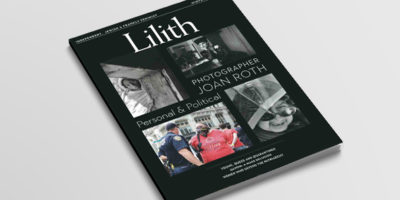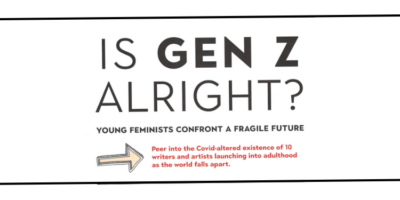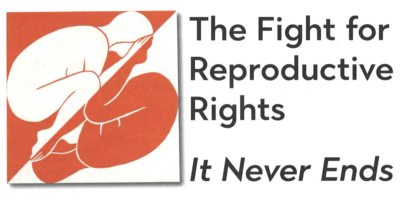
Fiction: Off the Roof
Aviva took a swan dive. Her father sometimes remembered a nose dive. She hit the ground, arms outstretched like wings, a clipped duck, a New York pigeon. The moment she leapt, she felt Yaacov, her husband, shudder. Later she learned that he was gone. Somehow, on his way to check on his school, he disappeared, slipped between the cracks on Queens Boulevard, slipped between the wheels of an SUV going too fast, slipped, Aviva thought, from one world to the next with no one around to say goodbye. Later, some said it was a miracle, a life for a life. Some said it was a tragedy, or maybe a cover-up for a scandal. No one
had a good explanation; not even the rabbi.
At the time, Aviva’s father, the rabbi, was standing behind her holding baby four. That’s how she referred to her children, one, two, three and four. Not that she didn’t love them. She adored them. Especially whichever was the youngest, when she could still feel their blood mixing with hers.
This one was the youngest by seven years. The lean years she had thought the whole time her husband manfully tried for a reversal of fortune. Barren, she could hear her husband thinking. Enough she answered him in her head. Barren is nothing and you have plenty.
Mostly she was silent. A few times she said, “What do you want?” She could feel the coldness in her mouth, the words formed from icicles. “Three aren’t enough? You don’t have enough happiness?” she asked, pointing up if they were downstairs, not sure whom she was addressing, not sure at whom she was pointing. Maybe the children, maybe her father’s photo taken at some fancy dinner. Or maybe it was at God himself.
She turned, smiled and handed number four to her father. “A little gift,” she said. Or at least,
that’s what her father, the rabbi, heard.
It was warm but windy. An early spring, her stepmother had mentioned, deferential as always. The stepmother wore a hat on her wig on her head. Very stylish, a regular modern woman, Aviva thought, wondering at the height of the railing. She had ordered it herself. “The children can play on this roof, which is really like a deck,” she had told her husband. “We don’t have to worry. They won’t climb over.” And in fact, she was very careful about the placement of the furniture. The roof was almost two stories up, over the garage that they had converted to a study. She gave strict instructions: nothing near the edge even though the railing was white
plastic, shiny, sealed, with no place for feet or hands.
Aviva spent a lot of time on the roof by herself, not counting the baby as separate, yet. She had a rocker, books and music. “I feel close to God,” she told her husband, who said it wasn’t right: a woman on the roof, not hanging clothes, not doing anything that he could see. “I can’t see what you’re doing, either,” she told him. “Not during the day and not at night. Tell my father if you don’t like it.”
She moved the table first. “Always decorating,” her stepmother said. Eight chairs to go around it. Solid chairs. No cushions. She moved seven without thinking. Two here, two there, two here, one there. One still to be moved. She pulled it, using her body as a fulcrum, facing it away from the table. She handed the baby to her father. Climbing up, she stood on the chair for just a moment and then quickly, so quickly, she climbed on the arms of the chair, getting her balance (her father thought she balanced for a second), climbed onto the top of the railing
and went over. Did she jump up? Were her arms indeed spread or did they cover her face? Did she remember to tuck her head in if she pointed her toes? Did she imagine herself a fancy diver, a dancer in flight? The dive wasn’t long: seconds. Or just one second. Everything seemed to be timed in one second moments the rabbi thought later. One second, maybe, for recognition, and then another ‘till the screaming began.
The baby who was being clutched too tightly was red-faced, her father dead white, the stepmother, who was checking her wig, her hat, her head and the baby, had been making cooing noises. She had her face turned away and sputtered “but, but, but” before almost-fainting onto one of the chairs when she heard the screams.
The recognition of Aviva here, Aviva gone, fast as it was, was almost too slow. The rabbi began to run: downstairs and out the back; in again for blankets, towels, pillows; out again for Aviva who lay so still. He was followed by two students. They fetched for him; they carried; they listened to his words of wisdom and wrote them down. Largely, they were useless.
The rabbi couldn’t get rid of the baby who was screaming in his ear. He knew he had to call the Jewish emergency ambulance service. He had to check on Aviva but his wife had her face to the ground, faint-hearted, swooning, unwilling or unable to take the screaming child.
Aviva’s father, the rabbi, bent down, to check for breathing, for blood. Truthfully, he didn’t know what he was checking for. He touched her face, tried to feel for air near her nose, her mouth. He turned this way and that struggling to remember where the nearest phone was to make some calls. The baby, thinking he was being rocked, finally quieted. Someone, maybe
one of the useless, finally handed him a phone. Even with shock on his face, and anger, he dialed automatic numbers as he tried to see if she was still alive, or, God forbid, which is all he could allow himself to think. The ambulance and its medical team were on the way. He expected them in two minutes. Their men spent their time studying in his own synagogue, two blocks away, waiting for a call, ready to leave in a moment, even during Yom Kippur, to save a life.
The question he asked himself as he looked up and down, his fingers hitting numbers, was why? And then, where was her husband? And then again, why?
The other children, thank God, were in school. The family had come for lunch. Aviva’s two sisters would be there shortly with their husbands. Their children, too, were in school. The
husband (where was the husband?) was being celebrated for getting a new position: Talmud teacher in the yeshiva which was only around the corner. And who cared, really, that he knew
things well enough, but not as much as he should. That when he was called on to answer questions, the answers went so deep and not deeper. Still, the rabbi knew when to keep quiet. After all, it had been he who had chosen Yaacov for Aviva, and there was no
going back from that.
“Rochel,” he said, “Rochel, take the baby.” She was his second wife, a good woman, a trifle vain, a bit vapid, but a good woman. She had tried to help him keep things together after his wife died. And although he had never been able to tell his first wife that he loved her, he knew the difference between this good woman who helped run the house and raise the children, except for Aviva who would have none of her, and the woman he had thought of as his bride.
People were gathering. He felt the air move around him; he heard the sirens outside. He did believe that Aviva’s chest was moving; that she was not, God forbid. He went to touch her face near her nose to see if he could feel air, his own breath stopped, but the habits of a lifetime were hard to break. His wife was the only woman who ever felt his hands upon her.
He noticed that Aviva’s skirt was up showing skin; showing thigh, the skin pale and smooth he was shocked to see, unable to decide if he should avert his eyes from his own daughter, still young enough to have a new baby. He could see the lace trim of her underwear. What was that? He had looked too long, he thought, even as he looked away.
He grabbed onto some skirt fabric to pull over her as a cover, keeping his eyes on her face, on her chest which he thought was still moving, thanks be to God. How could she let her skin
show? Where was her modesty? Where was her husband and why was he not in control of his wife? And yet, he knew even as he moved away to make room for the paramedics, that there was no answer. That Aviva would say, why not? Who would know? Her feet were covered, her ankles, her calves, even, with black knee socks. It was so like her to have defied the laws, defied him, even as she pretended to observe.
She was breathing, although her face looked dead white. So otherworldly, he thought.
Neighbors were gathering, asking if the rabbi was all right. He could hear them over the din of traffic. Lights hit the house and the ground in a staccato rhythm. “Rabbi, move, please,” he
heard. And where was the husband?
Oh, the mess of it. Aviva’s eyes wouldn’t open. Or maybe she wouldn’t open them. No bones seemed to be broken. She didn’t scream when they bent her arm this way and that and moved her legs so gently that she stayed covered, until she didn’t. A miracle is what everyone was saying. Indeed, it was miraculous that she survived. Even more so that they didn’t think she had broken bones. Maybe cracked ribs. Her breathing was shallow but steady. Still her legs and arms seemed to be intact. No one could figure out how. The rabbi looked up at the fencing and could see nothing. He looked at the ground and saw that she had landed on some small patch of grass covered by laundry. Sheets seemed to be crumbled under her. He knew that Yaacov pointed to the thriftiness of his neighbor’s wife; of her industriousness in
hanging clothes outside instead of using a dryer. He knew that Aviva had told Yaacov that if he liked the outside so much, he should hang the sheets himself.
The rabbi watched as the paramedics moved her body. He listened as they spoke to her, trying to get her to respond. They moved her head when they tried to stabilize her neck, and the rabbi could see that her head was definitely uncovered. He had thought she was wearing a wig. One of the newer expensive kinds so that you could hardly tell. But this was clearly her own hair. He noticed with a shock there was some grey at the temples. The men, he was grateful to see, didn’t react. They were all business as they hooked her up to some machine, to oxygen, “Just a precaution,” one of them said with deference, one observant Jew to another. Observance, Aviva always said, did not make you religious; it just made you a parrot.
“Bring her inside,”
“Rabbi,” Moshe Leibel said, “she took a fall. We have to bring her to the hospital for observation. She could have a concussion. She could have internal bleeding. What happened, exactly?”
He was thinking quickly. He knew Moshe well. He and his wife had been seekers: He was brought up as a Reform Jew knowing nothing. He met Shira shortly after coming to Sabbath services, and that was it for both of them. Shira was six years older and her parents cried to the rabbi every day that she would never be a wife or mother. That God was punishing them.
Moshe Leibel, the EMT had been Marc Landsman then and the rabbi had invited him and Shira to a Shabbat dinner. They sat across from each other as the rabbi drew him out: his attempt to reach some spiritual level through meditation, through nature, through the unfamiliar religious sounds of Buddhist chanting and Jewish davening. Shira had listened with a small
sly smile but rapture was in her eyes. They were married three months later and the rabbi had circumcised their three sons. Lately, he talked to him weekly, questioning him, counseling
him, worried about his relationship to his wife who had quit her job as secretary to the principal of the yeshiva. She had started a mail-order business selling sexy under clothes. “The marriage will get stronger if you stand firm,” the rabbi told Moshe Leibel. “And if you are patient, she will certainly return to her regular ways. Does she still follow the rules of family purity?” he asked. “She goes to Mikveh?”
“Of course,” Moshe Leibel had answered him. “She was trying to help me, rabbi. She wanted a business she could do from home. Mail order seemed perfect. I just didn’t know,” he said
his voice trailing off. “She has so many orders. She tells me it is a service to the community and I don’t know how to argue with her. Sometimes she models for me.” Moshe Leibel was blushing. “Is it wrong?”
The rabbi was appalled. His women dressed modestly. They covered their hair, their arms, their legs. They made sure that they didn’t attract other men. He explained this all to Shira, Moshe’s wife, who said, “No one sees what the women are wearing underneath. They buy through the mail. And we need the money. I looked for a way to bring it in. Moshe isn’t doing it. And there must be a need. I can hardly keep my stock.”
“You have a good man who works hard; he’s embarrassed. You know that in our community, word will get out. You will be the source of discord, of discontent.”
“Not if you don’t bring it up, rabbi, with all due respect,” Shira said. “Moshe would never talk about this, and I don’t think the women will tell, or their husbands, who might enjoy seeing
them look beautiful sometimes. I think Moshe likes it when I model for him.”
“Our women are not objects, Shira,” the rabbi said.
“Maybe the women just want to remember that they can be beautiful. Maybe even your wife, or your daughters. It’s getting late, rabbi,” she had said. “I have to take care of my children
now.” She walked out of the office before he dismissed her. Unheard of behavior.
AVIVA WAS MOST LIKELY one of her best customers. Probably her business had been Aviva’s idea. She liked working against him. The rabbi was ashamed of his thoughts, but he couldn’t stop them. Certainly no one needed a scandal. It was a bad business for the community; that’s what Aviva never understood. “Your community,” she had screamed at him after that terrible week-end when she disappeared before her marriage. “Yours,
not mine.”
“If it’s not yours, you lose everything,” he told her. “You won’t see me. You won’t see your sisters. Your mother is no longer here to save you.” Oh, such terrible words. He could see the shock of them register on her. Well, she had married. She had a family. She had seemed to reach some equilibrium. And now this.
HE COULDN’T ANSWER MOSHE directly. There was no quicker way to ruin a new career than gossip about the rabbi’s daughter who was also the wife of the new Talmud teacher, he
thought, wondering again where his son-in-law was.
The rabbi shrugged. “She was moving the furniture. She gave me the baby to hold and so I wasn’t watching her carefully. We were getting ready for lunch and the chairs were being moved around the table. Maybe one got stuck and she pulled too hard; maybe something fell over and she leaned too far. Maybe she caught something falling in the corner of her eye and reached for it. I don’t know,” he said, his lips continuing to move as he asked God’s forgiveness for his almost lie. He was caught in some strange territory between knowing and not knowing. He wondered how Aviva would answer these same questions when they came from him. Jumping, leaping. Interfering with God’s plan was a sin almost too great to contemplate.
“Moshe,” the rabbi said. “I trust you. Above all we must be careful with Aviva’s life, but if you think we can watch her here, if you think it’s enough if a nurse stays with her, or her sisters, or
my wife, or even you, if you have the time, of course, then she won’t be in trouble and won’t be away from her family. From the baby,” he said, pointing to somewhere behind him. Moshe was thinking. The rabbi could practically hear the cranking of his brain. “We’ll take her to the hospital. I’ll talk to them and they’ll check her as fast as possible. Then he added, “Aviva. It’s me, Moshe. Open up, Aviva. You took a fall and we have to take you to the hospital.”
Aviva’s eyes stayed closed even when they lifted her to load her into the waiting ambulance. Even when her baby woke and started crying. Even when Moshe, with some intuitive sense, put the baby on Aviva’s belly near her full breast. He turned for a minute and when he turned back he saw the baby nursing, the breast exposed. But Aviva lay still, eyes closed, arms and
legs dangling grotesquely over the edge of the stretcher so that Moshe, after checking the IV lines one more time, rested his hand on the baby’s back, ready to lift him and burp him and
maybe move him to the other breast, although he didn’t know how he would do that. He turned, praying that they would get to the hospital so quickly, his involvement would not be necessary. He was still praying when they pulled into the hospital bay and Aviva lay still, her hand cupping her baby’s head.
Art: Lindsay Barnett
Willa Rosenbach Morris holds an MFA in fiction from Columbia University and has been the co-editor in chief of a small literary magazine. This excerpt was taken from her novel, Stories from the Roof.




